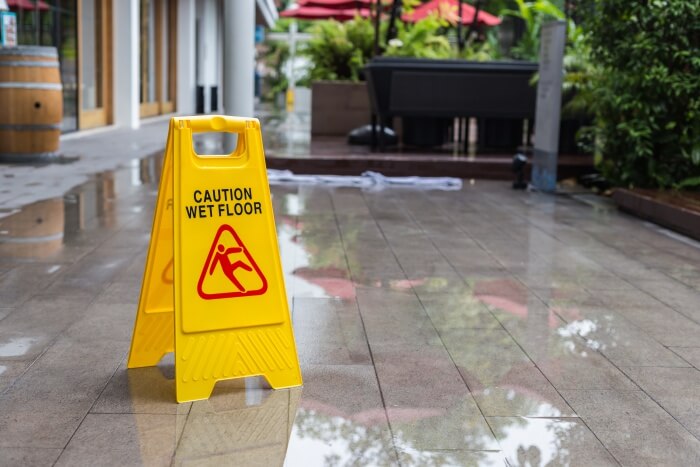My first home was a condo with a dark oil-finished engineered wood floor. The home was mostly modern décor. Several years after the floors were installed I was watching sports in the living room when my wife asked me why it sounded like there was a squishy sound on the wood floor.
Turns out it was a flooded floor…This caught my attention, prompting me to pause the game and investigate. Water had leaked from the edges of each plank, indicating an issue. I discovered the leak was from an air conditioning unit in the utility closet. A pebble stuck in the condensation tube had caused the water to overflow for weeks before we noticed.
Removing the pebble was easy but we still had a big mess on our hands. It was time to air out the concrete subfloors. Beneath the flooring, we used Floor Muffler, a padded acoustical underlayment which is a requirement by many condominiums for sound reduction purposes. This pad served as a barrier and reduced the amount of moisture soaking into my wood floors. I started by taking up the baseboards along the wall and each plank one at a time while saving the planks which were still in good shape.
The Insurance Company
In the morning, I called my insurance company to explain the situation. After gathering some basic details, the representative assured me they would send a claims adjuster to assess the site and collect additional information. Looking back, I wish I had reviewed my insurance policy to check my deductible before filing the claim. If the deductible is close to the cost of the damage, it might be better to pay out of pocket rather than risk being classified as high-risk by your insurance company.
When the claims adjuster arrived, I was eager to explain the damage to my floors. He introduced himself, and after I shared the details, he began by measuring the affected area and took a sample back to the lab for evaluation. He reassured me that they would be in touch soon with more information.
Remember, when replacing wood flooring you want to make sure to account for the cost of several things in addition to the flooring itself. These things include demolition, installation, remove and replace baseboards, underlayment, and transition pieces. If your floor has been discontinued, it’s crucial to replace the entire area with the same type of wood flooring rather than just the damaged sections. This approach will help restore your home to its original appearance. Mixing different flooring types can negatively impact your home’s value, creating an unsightly patchwork effect.
The Settlement
 After a few days, I received the promised information regarding the flooring and general labor costs, outlining the details. As someone knowledgeable about flooring, I found myself to be a bit of a harsh critic.
After a few days, I received the promised information regarding the flooring and general labor costs, outlining the details. As someone knowledgeable about flooring, I found myself to be a bit of a harsh critic.
The replacement was listed for laminate flooring, which is about $2.00 per square foot cheaper than engineered hardwood—an honest mistake. Furthermore, there was no padded underlayment, costing around $0.50 per square foot, which also needs replacement due to mold. The area I replaced was approximately 900 square feet, resulting in a total cost difference of over $2,000.
After I highlighted the differences, I was able to recover the costs by receiving a generous check to cover the expenses of the replacement. This made me wonder how many other homeowners might have overlooked some of these important details.
If you have a squishy, wet floor, start by checking your deductible and assessing the extent of the damage. For cost estimates, locate an old invoice or contact a professional for an appraisal. If you decide to involve insurance, create a checklist of affected areas and estimate replacement costs. Keep in mind that discontinued flooring can be difficult to value, but your local flooring expert can help identify the product.

